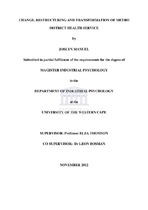| dc.description.abstract | The phenomenon of change has been the subject of debate for decades. Whether the change was planned or as the result of a catastrophic event, change affects nations, people, businesses, the economy and the environment. Typical changes in businesses are mergers, restructuring, transformations and retrenchments. Consequently, to this contentious phenomenon, change has been the subject of research by social scientists, behavioural theorists and analysts. Their collective endeavours have provided the world with a wealth of scientific knowledge. The Metro District Health Services in the Western Cape have undergone major restructuring and transformation. It is with this premise the question is posed, are change agents, leaders, and employees sufficiently empowered to mitigate the challenges and appease the expectations associated with restructuring, transformation and change?Supporting and contextualizing the study to the existing body of knowledge, previous research is reflected upon in an attempt to add value to future change initiatives. The reflections include different perspectives of change management, the multifaceted and evolutionary nature of change. The theoretical framework underpinnings of organisational development and transformation were also explored. One point of departure was to establish what is needed to ensure organisational success and describes activities, action plans and strategies, which modifies the organisational structures. The suggested methodologies, dimensions, variables influencing or enabling transformation formed the baseline for this study, with the emphasis placed on models of change, communication, theories of success formulae for organisational change, competencies of change agents, behaviour and attitudes of all stakeholders. Circumventing the purpose and contextualizing the baseline for this research, the survivor syndrome was explored and the dimensions of different change elements offered value to this study. The intent of the restructuring and transformation initiative, was to strengthen the Metro District Health Services by decentralizing Primary Health Care Services. Selected employees were tasked as change agents to facilitate the process and were simultaneously directly impacted by the process. The objective of this study is to explore and understand the effects of change on selected employees functioning at different levels within the Metro District Health Services during restructuring and transformation of the provisioning of healthcare services. In determining the effects the variables explored were their attitude towards change, their commitment to the organisation, the barriers and challenges encountered with the implementation of the process.The selected participants were part of an intensive restructuring and transformation process. The sample chosen from the population of 350 employees at the regional office of the Metro District Health Service and was representative of the greater population. The sample includes selected managers and employees at different hierarchal levels ranging from salary levels five to fourteen. Ensuring representativeness the different departments were used as strata and within each department a random sampling method was used to select respondents. Support was provided to explain that stratified sampling is a procedure of selecting a probability sample where a heterogeneous population is first divided into subgroups (known as strata) on the sampling frame, and simple random samples are drawn from each stratum. The research methodology was a combination of qualitative and quantitative research design. A questionnaire was distributed consisting of three sections, Section A Biographical Information, Section B Structured Interview (10 participants), Senior Managers were approached to conduct the structured face to face interviews asking open ended questions and Section C Survey Questionnaire was completed by the rest of the sample group by indicating on a likert scale their agreement or disagreement with the statements. The questionnaires have been demonstrated to be psychometrically sound in that their reliability and validity have been reported on and supported in previous studies. The analysis of the raw data involved statistical computations using Statistical Package for Social Science called Moonstats© and Thematic Content Analysis for the interpretation of the qualitative data. The limitations of the study are discussed as well as recommendations for future change initiatives and future research projects on the subject. | en_US |

